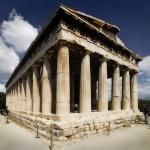|
This section contains 587 words (approx. 2 pages at 300 words per page) |

|
Alypius, Introductio musica (Introduction to Music; fourth–fifth century C.E.)—This treatise on music theory, in three books, contains interesting material not found elsewhere, some of which may go back to the school of Damon. Based partly on Aristoxenus, and influenced by the Pythagoreans and Neo-Platonists, it contains some unique rhythmic and harmonic doctrines.
Aristotle, Politics, Poetics, and Problems (c. 384–322 B.C.E.)—In these philosophical works, Aristotle analyzes the role of music in a civilized community, including the nature and function of different musical and poetic forms and the production, perception, and properties of sound.
Aristoxenus, Harmonika stoikheia (Harmonic Elements); 375/360–320 B.C.E.)—This treatise was one of the most influential theoretical works on music in antiquity, known only today through a series of fragments and excerpts. It focused on the tetrachord system, tonoi (scales), and intervals, and formed the...
|
This section contains 587 words (approx. 2 pages at 300 words per page) |

|



